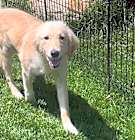No, you should not shave a Leonberger. Shaving this breed can affect the dog’s natural temperature regulation. It is important to brush Leonbergers regularly as they shed heavily.
Leonberger
Breed Type: Working
Common nicknames: Leo, Gentle Giant, Giant Lion
Coat: Double
Hypoallergenic: No, they will likely trigger allergies.
Temperament: Affectionate, loyal, gentle, calm
Life expectancy: 7-11 years
Color & patterns:

The Leonberger is a cross between a Saint Bernard, a Great Pyrenees, and a Newfoundland, making them one of the largest dog breeds out there; Leonbergers can weigh up to 170 pounds and stand about 30 inches tall. But don’t let their size intimidate you — they are just as sweet and loving as they are large. Leonbergers are super intelligent, easy to train, and love nothing more than to cuddle up with their humans.
Leonberger characteristics
Learn about about Leonberger basics like their fur colors, shedding levels, how much grooming they need, and other Leonberger facts.
Average height
26-31 inches (66.0-78.7cm)
Average weight
86-151 pounds (39.0-68.5 kg)
Average lifespan
7-11 years
Exercise needs
Grooming needs
Full-grown size
Good with cats
Good with kids
Training aptitude
Do Leonbergers shed?
Yes, Leonbergers are heavy shedders. Leonbergers blow their coat twice a year, so frequent brushing will help keep the interim shedding at bay. Try to brush your Leonberger at least once a day.
How big do Leonbergers get?
Leonbergers grow to be extra-large dogs, most weighing between 90 and 170 pounds and standing between 25.5 and 31 inches tall, with males being bigger than females.
How long do Leonbergers live?
Leonbergers live to be seven to nine years old. However, individual lifespans can vary based on factors such as genetics, diet, exercise, healthcare, and overall lifestyle. Providing proper care, regular veterinary check-ups, a balanced diet, and maintaining a healthy weight can contribute to helping dogs of all breeds live long and healthy lives.
When do Leonbergers stop growing?
Leonbergers reach their full size at about a year old but can fully mature up to the age of three years old.
Leonberger history
Learn about where this Leonberger came from!
What were Leonbergers bred for?
Leonbergers were bred as working dogs and used to haul carts, herd livestock, and even rescue people from the water. Leonbergers have also been used as flock guard dogs.
Where are Leonbergers from?
Leonbergers hail from the Southern German town of Leonberg, where they were bred down from Newfoundlands, St. Bernards, and Pyrenean Mountain Dogs in order to create a breed that looked like the lion on the town’s Imperial Coat of Arms.
Leonberger temperament
Learn about about the Leonberger temperament and how well they fit into your lifestyle, home environment, and family.
Are Leonbergers good with kids?
Yes, Leonbergers are good with kids. They are known as “gentle giants” because large and imposing though they are, they are also notoriously tender with small children and energetic playmates to active, older kids.
However, like all dogs, Leonbergers need to be trained to behave gently with children and vice-versa. As with any breed, it is recommended that your child is always supervised when interacting with your Leonberger to keep both the child and dog safe.
Do Leonbergers bark a lot?
Yes, Leonbergers bark because they were traditionally used as farm watchdogs in addition to being drafting and carting dogs; as such, they are alert barkers. As with any dog, they can be discouraged from barking as frequently with proper training and exercise.
Are Leonbergers good family dogs?
Yes, Leonbergers make affectionate and devoted family dogs. They require (and love) daily exercise, so an active family that wants a companion for their outdoor adventures is an ideal match for this breed. They love swimming, hiking, and running, too.
Are Leonbergers good with cats?
No, not all Leonbergers are good with cats. Leonbergers are a calm breed, though you may find that they give chase to your cat. Of course, each dog has their own preferences and temperament, and if properly socialized to your cat and introduced at a young age, Leonbergers can get along just fine with cats.
Are Leonbergers good with other dogs?
Yes, Leonbergers are generally good with other dogs if properly socialized but can be aggressive around dogs they are unfamiliar with, especially dogs of the same sex. However, a well-trained Leonberger will grow to be a gentle giant who is sociable with dogs, cats, and humans.
Are Leonbergers smart?
Yes, Leonbergers are quite smart. They are also known for their sound judgment and easy-going temperament. Leonbergers are eager to please and respond well to positive reinforcement, praise, treats, and affection. They excel in activities such as agility, obedience, and water rescue work.
Are Leonbergers protective?
Yes, Leonbergers are protective of their family and home. They are known for instinctively establishing and maintaining the territorial rights of their household. They like to lie in a strategic place where they can see everyone who comes and goes, keeping an eye on their family and their belongings.
Are Leonbergers good for first-time pet parents?
Some say that Leonbergers can be good for first-time dog parents because they are intelligent, loyal, and eager to please. However, Leonbergers are large and strong dogs that require a lot of time, dedication, and training to be well-behaved. They also require daily brushing and shed a lot, especially during their twice-yearly shedding season.
Are Leonbergers easy to train?
Yes, Leonbergers are known for being quick learners who enjoy training and socialization. However, training any dog takes substantial time and effort, regardless of breed, and Leonbergers are also incredibly powerful, strong dogs who require a confident and consistent trainer who will give plenty of positive reinforcement.
Don’t wait too long to start training your Leonberger — you’ll want to start early with this breed because of their size and strength.
Leonberger health
Learn about about the Leonberger health outlook and what diseases they may be prone to at various stages of their life.
Are Leonbergers healthy?
Leonbergers are a sturdy, robust breed with a rather short lifespan that is normal for their size. Health issues to keep an eye out for include:
Hip and elbow dysplasia: These are two of the most common skeletal diseases seen in dogs. They are similar diseases in which either the hip or elbow joint has grown abnormally or is misshapen. The abnormal shape prevents the joints and sockets from properly meeting one another, resulting in rubbing and grinding instead of sliding smoothly. Unlike in hip dysplasia, where the main problem is joint instability, the abnormalities seen in elbow dysplasia often result in pieces of bone and/or cartilage breaking loose and irritating the joint tissues. Over time, the rubbing from dysplasia can cause a variety of issues, such as pain, lameness, and secondary osteoarthritis. Surgery can be done to fix the joint if diagnosed before the onset of arthritis.
Addison’s disease: A malfunctioning hormone production in the adrenal glands.
Gastric dilation-volvulus: A sudden swelling of the abdomen.
Osteochondritis dissecans: A disease resulting from brittle bones.
Hypothyroidism: A thyroid malfunction that results from in low hormone production and could cause obesity, low energy, and a brittle coat.
Panosteitis: A self-limiting lameness or temporary limp.
Are Leonbergers hypoallergenic?
No, Leonbergers are not hypoallergenic. Regular grooming practices such as brushing and bathing can help reduce allergens on a dog’s coat and skin, however.
Do Leonbergers drool?
No, Leonbergers are one of the few large dog breeds that don’t drool much. However, they may occasionally slobber when stressed or after drinking.
Can Leonbergers live in hot weather?
Yes, Leonbergers can live in hot weather, but they are not suited to hot climates because of their insulating double coats. If you live in a hot climate, make sure to provide a cool place for your dog, limit exercise to cooler parts of the day, and give them lots of water and frozen treats.
Popular Leonberger mixes
A common Leonberger mix includes:
Shepherd-Leonberger (Leonberger + German Shepherd)

Find Leonberger puppies near you
Adopting a Leonberger
We don't see any Leonbergers available for adoption in your exact location or cities near you, but here are some adorable similar breeds in Columbus, OH.

Cutter (Baseball Litter '25)
Great Pyrenees
Female, 5 mos
New Albany, OH
Not good with dogs
Not good with cats

Flopsy
Great Pyrenees
Male, puppy
Columbus, OH
Not good with dogs
Not good with cats

Cadbury
Great Pyrenees
Male, puppy
Columbus, OH
Not good with dogs
Not good with cats

Cottontail
Great Pyrenees
Male, puppy
Columbus, OH
Not good with dogs
Not good with cats

Marshmallow
Great Pyrenees
Female, puppy
Columbus, OH
Not good with dogs
Not good with cats

Chicadee
Great Pyrenees
Female, puppy
Columbus, OH
Not good with dogs
Not good with cats

Peter
Great Pyrenees
Male, puppy
Columbus, OH
Not good with dogs
Not good with cats

Thumper
Great Pyrenees
Male, puppy
Columbus, OH
Not good with dogs
Not good with cats

Cutter (Baseball Litter '25)
Great Pyrenees
Female, 5 mos
New Albany, OH
Not good with dogs
Not good with cats

Flopsy
Great Pyrenees
Male, puppy
Columbus, OH
Not good with dogs
Not good with cats

Cadbury
Great Pyrenees
Male, puppy
Columbus, OH
Not good with dogs
Not good with cats

Cottontail
Great Pyrenees
Male, puppy
Columbus, OH
Not good with dogs
Not good with cats

Marshmallow
Great Pyrenees
Female, puppy
Columbus, OH
Not good with dogs
Not good with cats

Chicadee
Great Pyrenees
Female, puppy
Columbus, OH
Not good with dogs
Not good with cats





